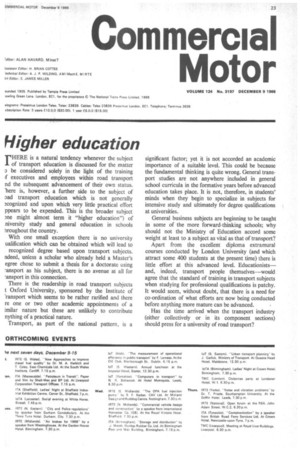Higher education
Page 25

If you've noticed an error in this article please click here to report it so we can fix it.
T HERE is a natural tendency whenever the subject I of transport education is discussed for the matter CI be considered solely in the light of the training if executives and employees within road transport nd the subsequent advancement of their own status. 'here is, however, a further side to the subject of oad transport education which is not generally ecognized and upon which very little practical effort ppears to be expended. This is the broader subject )ne might almost term it "higher education") of .niversity study and general education in schools Itroughout the country.
With one small exception there is no university ualification which can be obtained which will lead to
recognized degree based upon transport subjects. ndeed, unless a scholar who already held a Master's egree chose to submit a thesis for a doctorate using -ansport as his subject, there is no avenue at all for -ansport in this connection.
There is the readership in road transport subjects t Oxford University, sponsored by the Institute of 'ransport which seems to be rather rarified and there re one or two other academic appointments of a imilar nature but these are unlikely to contribute nything of a practical nature.
Transport, as part of the national pattern, is a significant factor; yet it is not accorded an academic importance of a suitable level. This could be because the fundamental thinking is quite wrong. General transport studies are not anywhere included in general school curricula in the formative years before advanced education takes place. It is not, therefore, in students' minds when they begin to specialize in subjects for intensive study and ultimately for degree qualifications at universities.
General business subjects are beginning to be taught in some of the more forward-thinking schools; why should not the Ministry of Education accord some weight at least to a subject as vital as that of transport?
Apart from the excellent diploma extramural courses conducted by London University (and which attract some 400 students at the present time) there is little effort at this advanced level. Educationists— and, indeed, transport people themselves—would agree that the standard of training in transport subjects when studying for professional qualifications is patchy. It would seem, without doubt, that there is a need for co-ordination of what efforts are now being conducted before anything more mature can be advanced.
Has the time arrived when the transport industry (either collectively or in its component sections) should press for a university of road transport?












































































































